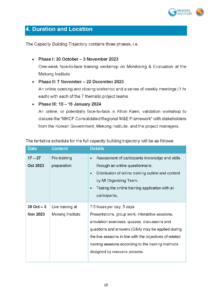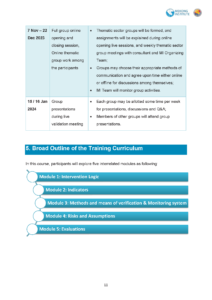
1.1 Background
The Mekong Institute (MI), an intergovernmental organization owned by the Governments of Cambodia, P.R. China, Lao PDR, Myanmar, Vietnam, and Thailand, primarily aims to promote regional development, cooperation, and integration at bilateral and multilateral levels. This is achieved through technical assistance, capacity building, policy advice, and the generation of targeted activities for development partners. As a result, MI contributes significantly to the socio-economic development and improved outcomes for the people of the Mekong region. Recognized as the knowledge center for the Greater Mekong Subregion, MI has been honored with the prestigious ASEAN Prize for its notable contribution to regional cooperation in the Mekong.
MI has been entrusted with managing the Mekong-Republic of Korea Cooperation Fund (MKCF). As part of this initiative, MI is implementing a project titled ‘Capacity Building on Regional Project Design, Implementation, Monitoring & Evaluation of MKCF projects (PRIME project)’. The project aims to enhance the capacities of the eligible partners under the MKCF program to properly implement their respective projects, thereby reinforcing regional cooperation and integration. The projects span across seven priority sectors, namely Culture and Tourism, Human Resources Development, Agriculture and Rural Development, Infrastructure, Information and Communication Technology (ICT), Environment, and Non-traditional Security Challenges.
Under the PRIME project, MI is currently preparing capacity development for government officials and implementing agencies on Regional Project Monitoring and Evaluation. For a successful implementation of the project, the Mekong Institute is currently envisaging:
- to equip the stakeholders with a comprehensive understanding of monitoring and evaluation (M&E) concepts, tools and techniques for regional projects
- Developing the M&E framework and the essential components of a M&E system for regional projects.
In the meantime, currently, the Mekong Institute is developing a cloud-based MKCF M&E system that integrates the management of MKCF projects and grants. This system will encompass the entire MKCF project cycle, including real-time progress tracking of various projects and grants, all within a unified framework. In addition to the cloud-based M&E system, there is a need to enhance institutional capacity in understanding the concepts of regional project M&E and its overarching elements. This will enable stakeholders to fully utilize the system and effectively engage with regional project M&E processes for better results.
1.2 Project Overview
The Mekong-Korea Cooperation Fund (MKCF) program aims to enhance the capacities of eligible partners by promoting regional cooperation and integration through collaborative projects in seven priority sectors. The program aligns with the Plan of Action (POA) 2021-2025 of the Mekong-Republic of Korea Cooperation, seeking closer collaboration with other regional initiatives and pursuing a shared vision of achieving a people-centered community.
The specific objectives of the MKCF include enhancing the capacities of national agencies in identifying and implementing regional projects, addressing emerging project management issues, developing a web-based monitoring and evaluation system, promoting institutional capacities for regional cooperation, and creating a platform for networking and sharing best practices among Mekong countries.
The Republic of Korea (ROK) aims to prioritize development support in areas where it can have the greatest impact and emphasizes local ownership for sustainability. Qualified project managers and personnel are needed to develop, implement, monitor, and evaluate projects that achieve desired results within budget and schedule.
The project on ‘Capacity Building for Regional Project Management of MKCF projects’ aims to enhance institutional capacities for regional cooperation and integration among Mekong countries and the ROK. This will be achieved through collaborative projects that address national and regional priorities, improving the quality of project identification, design, and delivery for sustainable development in the Mekong region.
The project outputs include conducting workshops, trainings, and roundtable meetings, developing a web-based monitoring and evaluation system, and conducting structured learning visits and evaluation workshops in Mekong countries.
The short-term outcomes include enhanced knowledge and skills in project cycle management, improved project performance through accurate reporting, enhanced cooperation and coordination among implementing agencies, and increased public access to project information through web platforms and social media campaigns.
The long-term outcomes include strengthened coordination mechanisms, enhanced sub-regional cooperation, and improved capabilities for sustainable economic and social development.
The overall impact of the project is enhanced regional collaboration for sustainable development in the Mekong region.
1.3 Description of the Capacity Building Trajectory
As part of the project, MI will conduct a series of activities to develop a regional and web-cloud based Monitoring and Evaluation system tracking progress in 7 sectors/thematic areas. The activities will be implemented in two phases from October 2023 until January 2024 using both face-to-face as well as online approaches.
The trajectory consists of the following 3 activities, which follow MI’s modular training cycle:
- Phase I: 30 October – 3 November, 2023
One-week face-to-face training workshop on Monitoring & Evaluation at the Mekong Institute - Phase II: 7 November – 22 December, 2023
An online opening and closing workshop and a series of weekly meetings with each of the 7 thematic project teams. - Phase III: 15 – 16 January, 2024
A validation workshop to discuss the “MKCF Consolidated Regional M&E Framework” with stakeholders from the Korean Government, Mekong Institute, and the project managers.
The broad aims of capacity building training workshop:
The 5-day training workshop is the beginning of a larger journey towards capacity building for the joint formulation of a regional multisectoral monitoring and evaluation framework, as well as building a culture of Results Based Management in the MKCF with the support of a web/cloud-based project management system.
This 5-day training workshop is designed to ensure that those who are trained will:
- Become familiar with the Sustainable Development Goals (SDGs), Results Based Management (RBM) and Monitoring &Evaluation (M&E) and how it relates to their projects.
- Understand core concepts, approaches and instruments as used by development agencies around the world related to Monitoring and Evaluation (M&E)
- Understand and practice with various tools used in M&E:
-
- Situation Analysis
- Theory of Change
- Logical/Results Framework
- Intervention logic
- Indicators, means and sources of verification & data collection
- Risk management
- Monitoring systems
- Different type of evaluations.
-
- Apply these tools and instruments in a context of regional and multi-sectoral project/program implementation
The formulation trajectory is expected to contribute to:
Beyond the 5-day workshop, a trajectory of sector meetings will take place from November 2023 until mid-January 2024, during which the regional M&E framework will actually be formulated and presented to the MKCF in January 2024. This trajectory will provide participants with the opportunity to apply the skills and knowledge acquired during the workshop in real-time, thereby gaining invaluable practical experience.
The purpose of the formulation trajectory is to:
- Jointly formulate a consolidated MKCF Regional M&E Framework based on 7 regional projects covering different sectors/themes.
- Seek validation and adoption by all key stakeholders on the joint MKCF Consolidated Regional M&E Framework.
This workshop and subsequent formulation trajectory are an exciting opportunity to delve into the heart of seven key areas of development: Culture and Tourism, Human Resources Development, Agriculture and Rural Development, Infrastructure, Information and Communication Technology (ICT), Environment, and Non-traditional Security Challenges. Each of these sectors represents a critical component of the region’s growth and prosperity, and our workshop is designed to ensure that each participant is well-equipped to contribute to these areas effectively and innovatively.
Target Participants by projects
The participants are members and stakeholders from: Cambodia (5), Lao PDR (6), Myanmar (6), Vietnam (3), Thailand (4), Korea (3), and international organization (3).
Target Group of Participants
The training program targets officials working for MKCF implementing agencies and associated government officials, responsible for implementing, monitoring and evaluating the program. The majority of these participants hold masters’ degrees or PhD.
These participants are working on the following sectors:
Infrastructure: 4 (Cambodia 2, Myanmar 2)
Environment: 10 (Cambodia 1, Lao 1, Myanmar 1, Vietnam 2, Thailand 3, Korea 2)
Human Resources Development: 4 (Cambodia 2, Lao 1, Myanmar 1)
ICT: 1 (Korea 1)
Agriculture & Rural Development: 8 (Lao 4, Myanmar 2, Vietnam 1, International Organization 1)
Culture & Tourism: (2 International Organization/Mekong Institute)
Non-traditional Security Challenges: 1 (Thailand 1)
Target Number of Participants
A total of 30 participants will participate in the trajectory, plus the training organizing team. In terms of gender breakdown: A total of 17 men, and 13 women.
Qualification of Applicants
The following qualifications were used to identify the participants to this Capacity Building Trajectory:
- Current MKCF Project Implementation Agencies (PIA) of the MKCF-funded projects representing the project, i.e. Head or person responsible for project M&E
- Master’s Degree or equivalent in development studies, economics, management, environment, or other relevant disciplines
- Experience with working in Mekong/ASEAN countries, especially in the development sectors is desirable.
- At least 5 year’s experience in implementation and M&E of projects
- Being able to communicate (speak, understand, read and write) in English is essential.
- Female candidates are encouraged to apply.
The Capacity Building Trajectory contains three phases, i.e.
- Phase I: 30 October – 3 November 2023
One-week face-to-face training workshop on Monitoring & Evaluation at the Mekong Institute - Phase II: 7 November – 22 December 2023
An online opening and closing workshop and a series of weekly meetings (1 hr each) with each of the 7 thematic project teams. - Phase III: 15 – 16 January 2024
An online, or potentially face-to-face in Khon Kaen, validation workshop to discuss the “MKCF Consolidated Regional M&E Framework” with stakeholders from the Korean Government, Mekong Institute, and the project managers.
The tentative schedule for the full capacity building trajectory will be as follows:
In this course, participants will explore five interrelated modules as following:
Module 1: Intervention Logic ↖🖱️
Module 3: Methods and means of verification & Monitoring system↖🖱️
Phase I: One-week face-to-face Training Course on “Regional Project Monitoring and Evaluation” | 30 October – 3 November 2023 (7.5 hours per day) | at Mekong Institute, Khon Kaen, Thailand.
The training program is designed to enable the participants to have a comprehensive understanding of the content of results-based management and Monitoring & Evaluation, focus on sharing of practical knowledge by the participants and resource persons, encourage exchange of information and ideas through group discussions, adopt participative methods, and foster networking among the participants. The language used of the training program will be English. The 5-day face-to-face training at MI will adopt the following methods and tools of delivery.
- Lectures and videos;
- Examples and case illustrations;
- Role plays
- Group work, exercises and presentations.
- Ice-breakers
The team of resource person(s), facilitators and moderators will be comprised of qualified MI and 1 external experts with knowledge and experiences on the concepts and issues related to Results-Based Management and Monitoring and Evaluation, which will be introduced and discussed during the training.
The Modular Training Program Flow Chart
The 5-day training sessions held from 30 October – 3 November 2023 at the Mekong Institute in Khon Kaen, will apply training methods in the following manner.
- The face-to-face training sessions at the Mekong Institute
- One-week before the training date, the MI Organizing Team will conduct Pre-Training Testing and Briefing Sessions to help participants to get familiar with the training agenda and prepared for the upcoming training. During this pre-training session participants complete the pre-training assessment so the consultant and MI can tailor the program as per their knowledge level and needs
- From 6 November – 22 December, the participants will work in thematic groups on the development of their regional M&E plan and system. The consultant and the MI Organizing Team will conduct weekly online zoom meetings. Each week one of the module topics will be addressed with the objective to build the regional M&E framework in a step-by-step manner.
- Each group will be provided with guidance, homework, and will be able to work on the homework in a manner they prefer.
- The consultant will encourage the participants to keep up with the development of the various steps each week, and monitor if the teams are delivering quality inputs.
- As needed addition materials and additional training materials and references could be provided by the consultants while the weekly group work is ongoing, and will be distributed by the MI Team;
- MI Organizing Team will conduct a pre- and post-training survey, daily feedback of the participants on the live sessions, mid-term and final evaluation through online survey methods (such as SurveyMonkey). To ensure full participation and attention, the quality of the work will be graded by the MI Team.
A monitoring and evaluation (M&E) mechanism will be put in place to assess the progress and measure the results of the intervention and every effort will be made to make it effective. The M&E will be introduced in the pre, during and post stages of the training program. We will follow Kirkpatricks model for evaluating the training and the entire trajectory. The following is suggested:
Reaction The first level gauges how employees react to the training workshop they’ve received. We do this by conducting a survey before and at the end of the course, and a final training assessment asking the following questions:
- repeat the questions on level of knowledge and level of skills. This allows for a more quantitative analysis if we compare the scores with the pre-workshop questionnaire results
- What were the biggest strengths and weaknesses of the training?
- Did the training program accommodate your personal learning style?
- What are the three most important things you learned from this training?
Learning At the second level we figure out if participants truly understood the training and whether they can actually apply the skill or do the tasks in their work.
We will follow up with another questionnaire before the formulation trajectory starts and ask about their levels of confidence in formulating their regional M&E framework, and what it is that they would still need to learn, before we start, and after we have completed the M&E frameworks.
Behavior During the formulation trajectory, we (MI team and the consultant) will assess their levels of how well they are applying their knowledge and skills by looking at the quality of their work. For example are the activities, short term outcomes, long term outcomes and impacts formulated clearly, are the indicators really measuring progress, contribution and attribution? The consultant will develop a scoring list for each of task team to fill out, and monitor the work after every exercise and our weekly meetings.
Results Finally, we will develop a separate questionnaire to determine if participants are happy with the end results, and if it has helped the program move forward? Has the training and technical support contributed to the setting up of a regional monitoring framework and practice, and are staff able to monitor the projects through the web-based system now?
Mr. Madhurjya Kumar Dutta
Director
Trade and Investment Facilitation (TIF) Department Mekong Institute (MI), Khon Kaen, Thailand
Tel: + 66 (0) 4320 2411 – 2 Ext. 2101
Mobile: +66 (0)87 492 7118
Email: [email protected]
Ms. Hyeyoung Lee
MKCF Project Manager
Mekong-Republic of Korea Cooperation Fund (MKCF) Trade and Investment Facilitation (TIF) Department Tel: +66 (0) 43 202 411 ext. 2111
Mobile: +66 (0) 80 639 5010
Email: [email protected]
Mr. Robby Rosandi
MKCF Project Coordinator
Mekong-Republic of Korea Cooperation Fund (MKCF) Trade and Investment Facilitation (TIF) Department Tel: + 66 (0) 4320 2411 – 2 Ext. 2110
Mobile: +66 (0)97 179 6003
Email: [email protected]
Ms. Sasiporn Phuphaploy
Program Assistant
Trade and Investment Facilitation (TIF) Department Mekong Institute (MI), Khon Kaen, Thailand
Tel: + 66 (0) 4320 2411 – 2 Ext. 2109
Mobile: +66 (0) 93-7785666
Email: [email protected]
Mr. Koen Walter Toonen
Resource Person,
Director QOEN Coaching & Consulting Hanoi, Vietnam
Mobile: +84934502706
Email: [email protected]
Website: www.qoen.biz
Mr. Koen W. Toonen has worked for over 25 years with various United Nations agencies (UNDP, UNEP, UNOPS and PeaceKeeping Operations), where he learned all there is to learn about results based project and programme management, monitoring & evaluation, advocacy and policy change, and management of networks and multistakeholder partnerships. After his time with the United Nations, he became an independent consulting, initially with MDF Training & Consulting, and now he has launched his own coaching & consulting firm for development and humanitarian workers.
His passion is to support development and humanitarian workers with technical support and career, life and mental health coaching to make his clients thrive professionally in their work, creating a better world as defined by the SDGs.




